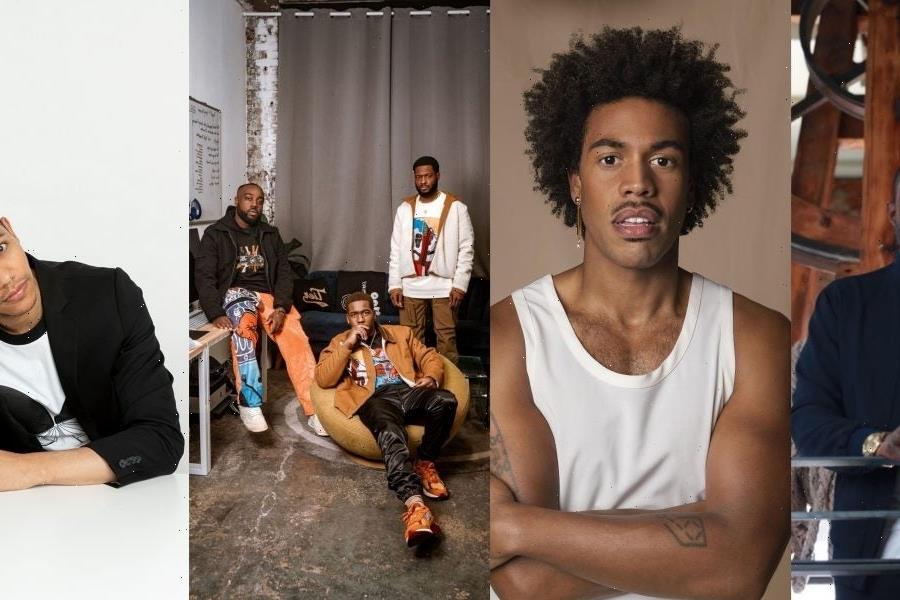
These Black Male Designers Are Embracing The Power Of The Pivot
09/07/2021Since its inception in 2007, Harlem’s Fashion Row has unapologetically championed and uplifted creatives of color in the fashion industry. By supporting emerging talent and bridging the gap between underrepresented Black and Latinx designers and established brands, HFR creates meaningful partnerships for those who may not have been afforded the opportunity due to marginalization, blatant colorism, and institutionalized racism. Harlem’s Fashion Row founder Brandice Daniel explained how the pandemic forced designers, stylists, and the fashion industry as a whole to have difficult conversations around not only defining but actually implementing diversity, inclusion, and equity efforts.
“Last year was probably the first time that I had real transparent conversations with brands — ever.” Daniel told ESSENCE proudly. “Last year took all my filters off.” In contrast to previous conversations where she would ask questions about diversity not-so directly, Daniel now positions herself to have uncomfortable, transparent conversations about Black representation in departments, on the runway, and in the boardrooms.
This year, Harlem’s Fashion Row will showcase its first lineup of all Black male designers including Johnathan Hayden, TIER, June 79, and Harbison. “This is our first time actually showing all collections by men, by the way. Even that is so exciting to me. This is so different,” Daniel told ESSENCE. This season’s presentation will premiere live tonight, September 7th 2020 during their 14th Annual Fashion Show & Style Awards on a virtual experience featuring spin sets from DJ Olivia Dope.
https://www.instagram.com/p/CThUDzrn-iG/
A post shared by HFR (@harlemsfashionrow)
Ahead of their NYFW SS22 presentation this evening, ESSENCE caught up with the designers for a candid discussion about their experience during the pandemic, how they’ve learned to prioritize their mental health and what to expect from Harlem Fashion Row’s upcoming NYFW SS22 show.
A Blessing In Disguise
Oddly enough, for designer Johnathan Hayden, 2020 was “weirdly my best revenue year” despite the worldwide pandemic. “It was really weird to accept happiness or gratitude when you were watching other people suffer,” Hayden admitted. He recalled witnessing his roommates move out of their apartment as he received an influx of orders, which was a surreal experience to say the least. As a self-proclaimed introvert living in New York City, the peace and quiet didn’t bother him too much but he immersed himself in his creativity and turned his home into a live-in self-care regimen. Boiling pots of hot water to pour into his bathtub and listening to soundbaths to pour into himself were his saving grace while Hayden tapped into what he described as his “crazy, beautiful mind.”
“The pandemic really made everyone take a pause,” he continued. “I wasn’t suddenly having to combat a system that is expecting things so fast and immediate.” Through this time of stillness, Hayden was able to dig back into his animation background and use 3D animation to sell his products and create a comic book for his brand — without the stereotypical fashion show experience inspired by his Japanese heritage. “It was just a way to take the adequate time to revisit some of my strengths that I might’ve forgotten about because I was working in a system that was telling me, ‘You’re only your job title, and you’re only the brown face, not the brown voice in the room,’” he says.
“I can honestly say that I woke up,” June 79 designer Shawn Pean said following up Hayden. Coming off of running an organization and serving as the former vice president and managing director at Balmain, Shawn Pean used the pandemic to sit down with himself and reevaluate his happiness. His day-to-day consisted of traveling the world, buying products, building strategies and ensuring that the company was making money. However, he knew there was more for himself than what he was doing. “At first, I thought it was very fulfilling, but once I was home and just present and seeing what was happening around me, it really woke me up,” Pean admitted. Though most of us may talk to ourselves for the organization of our own minds, Pean heard the voice of his late brother which further pushed him to kick his vision into high gear. “When you live in your head, you start to hear voices and for me, that was happening, but it wasn’t my own, it was my brother’s voice, funny enough,” he confided. “We lost him actually a decade ago.” His brother was telling him that now was the time to do what he wanted to do and that he could be the “next FUBU,” though he had different plans to embark on this entrepreneurial journey. “I knew that it was a moment to transform and do something and be something a little bit more,” Pean continued to describe his COVID experience. “The pandemic is the gift and the curse because we all gained so much, but we have to see so many people lose so much, including themselves. The pandemic for me was transition.” The Curse Of Grind Culture Businesses were shutting down, families were losing their homes and jobs were laying off employees. The fatal social media scroll put the batteries in our backs to believe that if we didn’t hustle and grind till our wit’s end, we would end up on the other side. So how did these designers put their mental health first, quiet the noise of imposter syndrome, and keeping their nose to the grinder while keeping their head in the game? TIER co-founder Nigeria Ealey admitted that he’s just now learning about the importance of taking breaks between successes and having a second to unwind amidst the madness that is the world of fashion. “It’s like now it’s kind of clicking where it’s like you can’t stay on a 100 [percent] 24/7 because you’ll speed past the things that you need. It’s definitely a process,” Ealey said. Between donating over 1500 meals to over 12 hospitals through Meals for Meds and mocking up, sketching, and designing their latest TIER Island capsule, establishing the balance between the personal and professional avenues had its pros and cons. “Last year there was really no chill time but the results that we got were also very rewarding,” he says. “This is what it looks like when you actually put in focus and have the time to focus without distractions. Now you need to figure out how to do that same thing with personal time in it, with time for mental and for yourself.” Hayden admitted to having to readjust to the idea of putting himself first, especially with people around him jesting at the idea of resting being for the weak and deceased. “People joke about how sleep comes after death, so that’s candid and crass. I really had to deprogram myself coming out of all of that. I don’t need to kill myself to feel like I’m keeping up, I do need to sleep,” he said. When first moving to New York City, Hayden went into survival mode but soon realized that a period of transition was necessary in order to perform at his best mental, emotional and physical state. “I realized I was 30 pounds underweight. I started quitting and started saying no, and really just started to focus on myself [and] my weight,” he said as he described his transition into a better wellness routine aside from grind culture’s glamorized system of always being on top. “Now, I have a MyFitness app and you see my weight just like skyrocketed because I suddenly was eating a normal amount of food for a human.” Lincolnton, NC native Charles Harbison took matters into his own hands — rejecting the toxicity of grind culture and relocating altogether. “The ability to go in, slow down and further release from the hustle or the grind, neither of which I love anymore, is really what led me to leave New York five years ago and come to LA to assume a different relationship with myself, the brand, and my career at large,” the Harbison designer told ESSENCE. The architect turned fashion designer, who has dressed notable public figures including Beyoncé and Michelle Obama had to ask himself questions such as “How do I run this business without it killing me?” To his own self, he answered with mindfulness and honesty. “Now I’m in a place where I’m able to approach the business with a bit more thoughtfulness of myself and my team, but also ideas around sustainability,” Harbison continued. “When we fall in line with the industry dynamic of grinding and hustling, there’s just so much irresponsibility, not only to ourselves but to the product and how we go about the process. I want it to be more imperative for everyone, namely people of color and marginalized people, so they understand that there is a space where we don’t have to be at the mercy of white capitalism and we can save our lives in greater ways.” Lean On Me People with successful careers always mention the importance of having someone behind them who is championing them in every room they step in. When transitioning from one career into another, or simply seeking generalized professional advice, having a mentor is ideal. However, Daniel can name one thing more important than the frequently-used word so often tossed around in career conversations. “The mentee-mentor relationship is really important, but what’s even more important is seeking wisdom,” she says. “Even if this person is your mentor, it doesn’t mean that they have the wisdom to give you. Wisdom is the shortcut. And even if that person isn’t your mentor, do you have a person who has the wisdom? Are they willing to share it with you? Because that’s invaluable. I don’t put too much emphasis on mentor-mentee. Get the wisdom. Wisdom is the most valuable thing we can get over everything.” In agreement with Daniel, Ealey also added that seeking out and securing mentorships in the fashion industry isn’t the easiest task in the world. “Sometimes it is hard to find mentorships,” he said before transitioning the conversation to a more sentimental topic. He, alongside the other designers, gave Daniel her well-deserved flowers for creating a platform for underrepresented and marginalized communities in the fashion industry. All of the designers were in agreement that none of their careers would be where it is today without the work, tirelessness, and audacity of Brandice Daniel and Harlem’s Fashion Row. “For her to help us on so many different levels as a brand is something that has no monetary value,” Ealey said continuing to praise Daniel. “This is somebody that’s constantly there for you, helps you grow, shares knowledge and gives insight on things that you may or may not have known.” TIER‘s Esaïe Jean-Simon chimed in to give his respects to Daniel as well. “Her passion and dedication to shifting this industry is what draws so many people to her, it’s so authentic.” Source: Read Full Article

